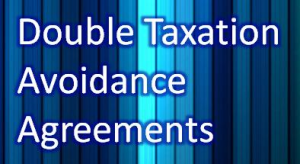In this blog post, Nabarun Roy, Superintendent of Central Excise and Customs, Export Refund Section, Central Excise, Kolkata – I Commissionerate, Kolkata under the Dept. of Revenue, Ministry of Finance, Government of India, who is currently pursuing a Diploma in Entrepreneurship Administration and Business Laws from NUJS, Kolkata discusses Double Tax Avoidance Agreements and focuses on the topic ‘Should withholding tax be deducted for Facebook ads, AWS and other offshore suppliers?’
Introduction
An offshore supplier is a firm enrolled or joined outside the nation where it has its fundamental workplace and operations, or where its chief speculators live. The Indian Constitution has engaged just the Central Government to exact and gather charges. Each individual whose aggregate pay surpasses the most extreme exception limit should be chargeable to the pay tax at the rate or rates recommended in Income Tax Act.
The income tax to be paid by the individual is resolved on the premise of his private status. An individual can be termed as a “resident” on the off chance that he stays for the recommended period in the previous year (1st April to 31st March) either for 182 days or more or 60 days or progressively and has been in India in total for 365 days or more in four years, before earlier year. Any individual who does not fulfill this necessity is termed as a ‘non-resident’.
Where any installment is to be made to a non-resident, the payer is obliged to deduct at source. According to Section 195 of the Income Tax Act, a commitment to the individual in charge of the instalment has to deduct charge at source at the season of installment or the season of the credit of the wage to the record of the non-resident.
On the off chance that the payment would not be taxable, the individual in charge of making such installment may make an application to the officer to decide the suitable extent to which it should be chargeable to tax. The expense is required to be deducted just on the taxable extent.
The tax is to be decreased at the rate endorsed in the Act or any rate indicated in Double Taxation Avoidance Agreement, whichever is more useful to the assessed. Any individual making an installment to any non-inhabitant might be at risk to deduct charge at the rates determined.
Direct Tax: A tax that is paid straightforwardly by an individual or association on a substance on which it is imposed. A citizen pays an immediate duty to an administration for various purposes, including genuine property charge, individual property charge, salary imposes or assesses on resources.
Income Tax: An expense that administrations force on money related salary produced by all elements inside their purview. Income tax is a key wellspring of assets that the administration uses to reserve its exercises and serve people in general.
Indirect Tax: Government needs to perform numerous capacities in the release of its obligations like framework advancement, well-being, instruction, resistance of the nation, evacuation of destitution, upkeep of lawfulness, and so on. To meet these necessities, immense measure of capital is required. The administration gathers cash from open through a wide assortment of sources i.e. expenses, fines, additional charges and duties. Roundabout Tax is an expense that builds the cost of a decent with the goal that buyers are paying the assessment by paying more for the items.
1) Service Tax: Service Tax is a type of circuitous assessment forced on determined administrations called “taxable services.” The goal behind demanding administration expense is to diminish the level of power of tax collection on assembling and exchange without compelling the legislature to trade off on the income needs.
2) Excise: Central Excise obligation is a roundabout assessment which is required and gathered on the products/items fabricated in India. The Central Excise Act, 1944 and other associated rules which accommodate toll, accumulation, and associated methodology.
3) VAT: VAT is an expense on the quality option and a multi-point charge, which is collected at each phase of the offer. It is gathered at the phase of production/resale and considers refunding of expense paid on inputs and buys.
Withholding Tax is a commitment on the payer to withhold charge at the season of making installment under indicated head, for example, rent, commission, pay, proficient administrations, contract and so on at the rates determined in assessment administration. The withholding charge procurements are in the way of apparatus procurements appropriate to the payer of the salary to empower simple gathering and recuperation of duty and are free of the charging procurements which are pertinent to the beneficiary of the organization.
VAT on Facebook ads: Whether VAT is to be charged on Facebook ad purchases will depend on whether the ad is purchased for business purposes and the country of your residence.If the business’s billing address is outside of the European Union, there won’t be charged VAT.[1] It is to be noted that Facebook has its headquarters in Ireland. India and Ireland have entered in DTAA (explained later), and one of provision looks as below:
Business Profits (Article 7)
“Under this Article, each contracting state agrees not to tax the business profits of an enterprise of the other state unless the enterprise has a permanent establishment in that other state. If there is a permanent establishment, the other state may tax only the profits attributable to the permanent establishment. The article sets out the rules by which the profits of a permanent establishment are to be attributed.”
| Country | Date of Signing | Income Tax | Corporation Tax | Capital Gains Tax |
| Ireland | 06 Nov 2000 | 01 Jan 2002 | 01Jan 2002 | 01 Jan 2002 |
India has marked DTAA with numerous nations. The point is to maintain a strategic distance from twofold tax assessment of same income. The bargain can be respective, that is, apply to just the two nations being referred to, or multilateral. These settlements benefit organizations and people who procure in nations other than their nation of home given such a game plan exist between their nation of living arrangement and the nation/nations where their wage sources are.
The advantages of DTAA are lower withholding (charge deducted at source or TDS), exclusion from assessment, and credits for expenses paid on the doubly-exhausted wage that can be enchased at a later date. An aggregate of 85 nations as of now have DTAA concurrences with India. The following nations have Double Taxation Avoidance Agreement with India.TDS rates on interests are recorded beneath. (Recorded one after another in order)
| Sl No. | Country | TDS Rate |
| 1 | Armenia | 10% |
| 2 | Australia | 15% |
| 3 | Austria | 10% |
| 4 | Bangladesh | 10% |
| 5 | Belarus | 10% |
| 6 | Belgium | 15% |
| 7 | Botswana | 10% |
| 8 | Brazil | 15% |
| 9 | Bulgaria | 15% |
| 10 | Canada | 15% |
| 11 | China | 15% |
| 12 | Cyprus | 10% |
| 13 | Czech Republic | 10% |
| 14 | Denmark | 15% |
| 15 | Egypt | 10% |
| 16 | Estonia | 10% |
| 17 | Ethiopia | 10% |
| 18 | Finland | 10% |
| 19 | France | 10% |
| 20 | Georgia | 10% |
| 21 | Germany | 10% |
| 22 | Greece | As per agreement |
| 23 | Hashemite Kingdom of Jordan | 10% |
| 24 | Hungary | 10% |
| 25 | Iceland | 10% |
| 26 | Indonesia | 10% |
| 27 | Ireland | 10% |
| 28 | Israel | 10% |
| 29 | Italy | 15% |
| 30 | Japan | 10% |
| 31 | Kazakhstan | 10% |
| 32 | Kenya | 15% |
| 33 | South Korea | 15% |
| 34 | Kuwait | 10% |
| 35 | Kyrgyz Republic | 10% |
| 36 | Libya | As per agreement |
| 37 | Lithuania | 10% |
| 38 | Luxembourg | 10% |
| 39 | Malaysia | 10% |
| 40 | Malta | 10% |
| 41 | Mauritius | 7.50-10% |
| 42 | Mongolia | 15% |
| 43 | Montenegro | 10% |
| 44 | Morocco | 10% |
| 45 | Mozambique | 10% |
| 46 | Myanmar | 10% |
| 47 | Namibia | 10% |
| 48 | Nepal | 15% |
| 49 | Netherlands | 10% |
| 50 | New Zealand | 10% |
| 51 | Norway | 15% |
| 52 | Oman | 10% |
| 53 | Philippines | 15% |
| 54 | Poland | 15% |
| 55 | Portuguese Republic | 10% |
| 56 | Qatar | 10% |
| 57 | Romania | 15% |
| 58 | Russia | 10% |
| 59 | Saudi Arabia | 10% |
| 60 | Serbia | 10% |
| 61 | Singapore | 15% |
| 62 | Slovenia | 10% |
| 63 | South Africa | 10% |
| 64 | Spain | 15% |
| 65 | Sri Lanka | 10% |
| 66 | Sudan | 10% |
| 67 | Sweden | 10% |
| 68 | Swiss Confederation | 10% |
| 69 | The Syrian Arab Republic | 7.50% |
| 70 | Tajikistan | 10% |
| 71 | Tanzania | 12.50% |
| 72 | Thailand | 25% |
| 73 | Trinidad and Tobago | 10% |
| 74 | Turkey | 15% |
| 75 | Turkmenistan | 10% |
| 76 | UAE | 12.50% |
| 77 | UAR (Egypt) | 10% |
| 78 | Uganda | 10% |
| 79 | UK | 15% |
| 80 | Ukraine | 10% |
| 81 | United Mexican States | 10% |
| 82 | USA | 15% |
| 83 | Uzbekistan | 15% |
| 84 | Vietnam | 10% |
| 85 | Zambia | 10% |
DTAA is a viable money related understanding that is gainful to both the citizen and also the separate duty gathering dominant presences in different nations. Under the tax collection administration, the Delhi High Court in Linde AG held that the consortium amongst Linde and Samsung was not shaping an Association of Persons, and the agreement between them was distinct. The High Court held that offshore supply was not assessable in India since the property was exchanged outside India and the agreement was not bringing about a business association in India. [2]
Supreme Court clarified that withholding tax is not to be levied when the income has no territorial nexus with India or is not chargeable in India: Samsung WHT decision in the case of GE India Technology Centre Private Ltd v. CIT (9th September 2010).[3] The landmark decision of the Supreme Court in GE India Technology essentially overrules the Karnataka High Court’s Samsung choice and gives respite from the required TDS instalment and derivation on outside settlements without any India nexus.
The Supreme Court of India has held that any installments made to non-occupants will be liable to withholding assess just when such installments are chargeable to impose in India in its 9 September 2010 judgment maintained on account of GE India Technology Centre Private Ltd v. CIT.
Footnotes:
[1]https://www.facebook.com/business/help/133076073434794
[2]W.P. (C) No. 3914/2012 & CM No. 8187/2012
[3]MANU/SC/0688/2010
 Serato DJ Crack 2025Serato DJ PRO Crack
Serato DJ Crack 2025Serato DJ PRO Crack











 Allow notifications
Allow notifications


